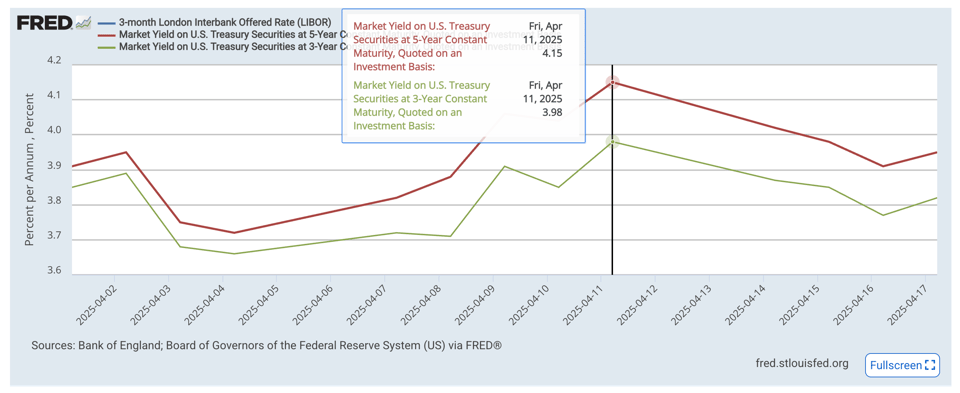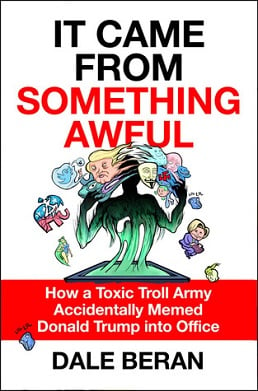Free-Range Parenting and All-You-Can-Eat Internet

Happy Easter to the citizens of Takes & Typos-istan
If you're celebrating, I hope you're surrounded by family and loved ones. Because of the holiday, I’ll keep this newsletter brief—but there are a few things I wanted to put out there.
I.
During the 2008 financial crisis, NPR launched a podcast called Planet Money. At the time, I was an obsessive listener. One of their regular features was the “Indicator of the Day” a data point or economic tidbit that gave you a sense of what was happening in the global economy. This is where I first learned about the TED spread—a measure of the difference between the interest rates banks charge each other (the LIBOR) and what the US government pays to borrow money (Treasury Bills). A rising TED spread typically signals fear or instability in financial markets. It’s an indicator I’ve kept an eye on ever since.

Well, I’m going to steal their gimmick—for the next little while, at least—and give you a weekly indicator of the state of affairs.
Here’s one: an “in times like these” article from AARP, advising its members—America’s retired people and senior citizens—on how to guard their privacy and avoid detention when dealing with the sprawling police state that immigration and Customs and Border Protection have become. I was especially struck by this passage:
You also can travel with an inexpensive and relatively anonymous secondary device or burner phone, one without your contacts, photos and revealing texts. But be aware that having a device with barely any content on it could raise alarm bells.
That said, many people have perfectly plausible reasons why they’re traveling internationally with a phone with only a few basic apps and not much else. You could be on a business trip and have proprietary or client data that your employer dictates must stay in the U.S.
The fact that AARP is now advising retirees on how to carry burner phones to avoid government intrusion and surveillance is a screamingly bright red flag about the direction of things.
II.
In a prior newsletter, I wrote a bit about the online manosphere and the way it’s gotten its tentacles into young men. I think it’s one of the most important forces shaping (and warping) the trajectory of society.
But let me tread carefully here.
I'm not a parent.
I don't want to be a parent. I've never wanted to be a parent. The idea of becoming a father has never, not once, seemed like something I’d be into. Thinking too long about parenting just makes me feel tired.
That said, one of the things that strikes me about the manosphere is how it's largely an out-group of young men with unfettered, unsupervised, and infinite access to the internet—seemingly from the day they're born. These young men are preyed on and groomed by influencers, propagandists, and straight-up liars.
I wasn’t raised this way.
Nobody in human history until about the year 2000 was raised this way. But there’s a societal reckoning coming over all-you-can-eat iPad-and-internet parenting.
III.

If you’ve encountered me in person over the last few months, you know I can’t stop talking about Dale Beran’s phenomenal book It Came from Something Awful. One of the anecdotes from the book that’s seared into my brain is about Frederick Brennan—a former regular on 4chan and the creator of 8chan, now called 8kun. Brennan talks about discovering 4chan at the age of 12 and immediately becoming obsessed with the porn- and hate-infested imageboard.
If you have no idea what any of that means, congrats—you’re living a virtuous life.
The chans are a network of imageboards on the internet with near-zero moderation. An imageboard is a website where people post images about a particular topic and reply to each other’s posts. These spaces have been the birthplace of countless internet memes—and also incubators for extremist violence, including numerous mass shootings (here, here, and here).
A deep dive into the chans isn’t practical in the time I have today, but here's the gist: they’re spaces where “free speech” often really means I want to be free to say incredibly racist, homophobic, misogynistic, ableist, and whatever-other-ist things I can think of with zero consequences.
Trends that started on the chans have made their way into mainstream society and social media: Rickrolling, GamerGate, calling people “NPCs,” and the hacker collective known as Anonymous are just a few notable examples.
When I was a kid, I was allowed to roam the neighborhood with my friends on our bikes. The only real restriction was to stay away from the corner store on 23rd Street and to be home before the streetlights came on. I’ve heard this kind of upbringing—extremely late Gen X—called free-range parenting.
I emerged from my free roam of Tacoma’s neighborhoods mostly unscathed. But today, there’s an entire generation of kids with free-range access to the whole-ass internet, and let me tell you: this is not working.
That’s my big takeaway from digging into the manosphere. A lot of parents—many for understandable reasons—don’t know what their kids are consuming online. And a lot of young boys don’t understand how harmful that content is until it’s too late, and they’re hard-boiled into some weird, misogynistic, men’s rights, crypto-fascist ideology.
Someone once told me that if you’re looking at a complicated problem and your solution is really simple—for example, we should probably keep tabs on what young men are consuming online—then your solution is too simplistic. But I don’t think that’s the case here. I really do think we need to do a better job, collectively, of keeping an eye on what young men are consuming—both in terms of content and quantity.
The internet is an amazing tool for good. It’s transformed my life—kind of like shawarma. But like shawarma, you can have too much of a good thing.
III.
Speaking of It Came from Something Awful, my wife recently joined me in rereading the book, and I highly suggest you check out her review over on her blog.
IV.
Lastly, speaking of the manosphere, I really think you should also check out the Netflix series Adolescence. It’s a spectacular work of television that aligns with much of what I’ve written above. It’s a British production with a well-cast ensemble. There are only four episodes, and the showrunners pull off some absolute heroics with cinematography—each episode is filmed in one continuous shot.
No one I’ve talked to who’s watched it hasn’t enjoyed it—actually, let me walk that back. You don’t really enjoy this series—you appreciate it. I really think it’s worth your time.
Folks, I would love to hear from you this week. If you have thoughts on the manosphere, if you’ve read (or are reading) It Came from Something Awful, or if you’re watching Adolescence, blow up my inbox.
See you in seven. Be well.